7 Tax-Friendly Countries for Remote Workers in 2025
Want to save on taxes while working remotely? Here’s a quick guide to seven countries offering tax benefits, affordable living, and great quality of life for remote workers in 2025:
- Greece: 50% income tax exemption for seven years, with Digital Nomad and FIP visa options. Costs start at £720/month.
- Dubai (UAE): 0% income tax, 5% VAT, and no tax on capital gains. A top choice for expats with a vibrant lifestyle.
- Barbados: 0% personal income tax under the Welcome Stamp programme, allowing you to live and work for up to a year.
- Estonia: Digital Nomad Visa with no tax on income if you stay fewer than 183 days. Advanced e-tax systems simplify processes.
- Malta: Flat 15% tax on foreign income under the Global Residence Programme. Minimum annual tax is £12,900.
- Croatia: Digital Nomad Visa with no tax on foreign income. Monthly costs start at £800.
- Portugal: New IFICI programme offers a flat 20% tax on qualified professions, plus foreign income exemptions.
Choose the best country based on tax savings, visa requirements, and living costs. Start planning your move today by securing health insurance, proof of income, and understanding local tax rules.
Best Digital Nomad Visas with Tax Benefits in 2025: Save on ...
1. Greece
Greece provides enticing tax incentives for remote workers in 2025. Under the employed foreigners regime, 50% of income is exempt from taxation for seven years, as long as individuals spend at least 183 days annually in Greece. Applications for this programme must be submitted by 31 March.
Remote workers can also choose between two visa options to live and work in Greece:
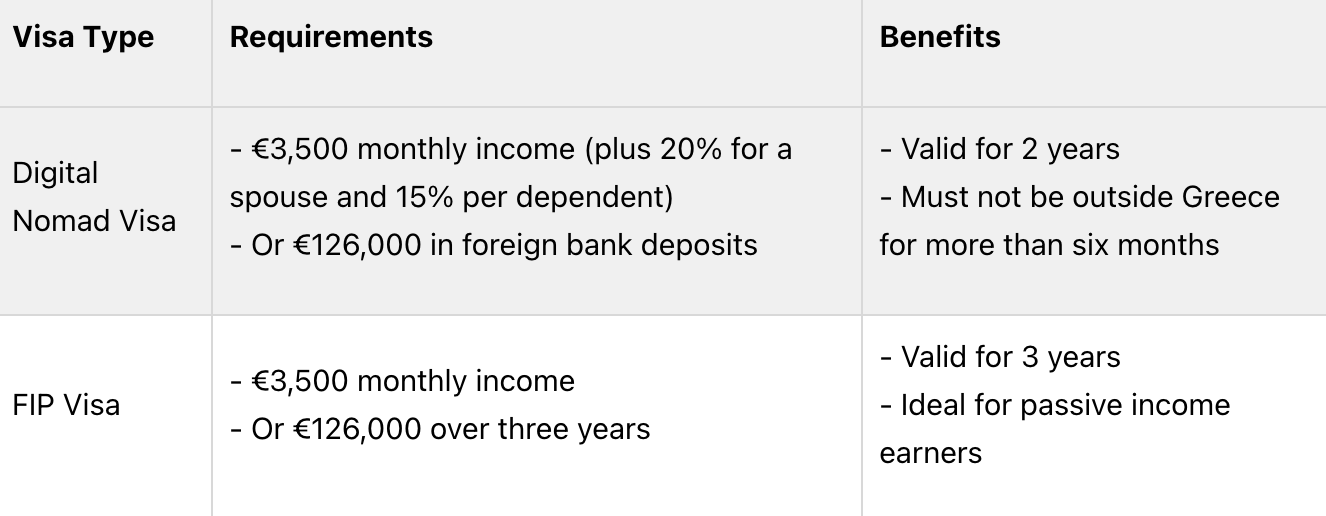
Applying for the Digital Nomad Visa involves a €1,000 fee plus €16 for the residence card. EU citizens, however, only need to register locally within three months of arriving [4].
Greece further strengthens its appeal with 57 Double Tax Treaties, including agreements with all EU countries, India, and China, offering opportunities for tax savings. For high-net-worth individuals, a separate regime allows a €100,000 annual flat tax and exempts foreign assets from inheritance and gift taxes for up to 15 years.
To get started, securing a Greek taxpayer identification number (AFM) is essential.
2. Dubai (United Arab Emirates)
Dubai boasts a 0% income tax rate - no taxes on income, wealth, inheritance, payroll, or capital gains - and only a 5% VAT on most goods and services. Coupled with relatively low rental taxes (see table below), this makes Dubai an appealing choice for remote workers.

The UAE's fiscal policies are supported by strong state revenues and focus on maintaining low taxes. With foreigners making up more than 85% of the population, Dubai has cultivated a thriving expat community.
In addition to tax benefits, Dubai offers a mix of global business opportunities, advanced infrastructure, high-quality healthcare, and a wide range of leisure activities. This combination makes it a top choice for remote workers aiming to boost their earnings while enjoying a high quality of life in 2025.
With its tax-friendly policies and vibrant expat community, Dubai stands out as one of the world's most attractive destinations for professionals. Next, we take a closer look at Barbados.
3. Barbados
Barbados provides an appealing tax setup through its Welcome Stamp programme. The highlight? A 0% personal income tax rate for digital nomads [6], making it an excellent choice for remote workers in 2025.
The Barbados Welcome Stamp lets remote professionals live and work on the island for up to a year. For families, there's an added benefit: children of Welcome Stamp holders can attend local schools or be home-schooled without needing a separate visa.

These simple residency benefits, combined with Barbados' tax policies, make it an attractive option. Plus, with living costs lower than many other countries, remote workers can stretch their savings further.
Next, explore Estonia's tax perks.
4. Estonia
Estonia has become a popular choice for remote workers in 2025, thanks to its advanced digital systems and favourable tax policies. The Digital Nomad Visa allows remote professionals to stay for up to 12 months and offers practical perks. To qualify, applicants need to show a gross monthly income of at least €3,504 over the past six months. Plus, if you stay fewer than 183 days in a 12-month period, you won’t be subject to income tax in Estonia.
Here’s a quick breakdown of the key details:
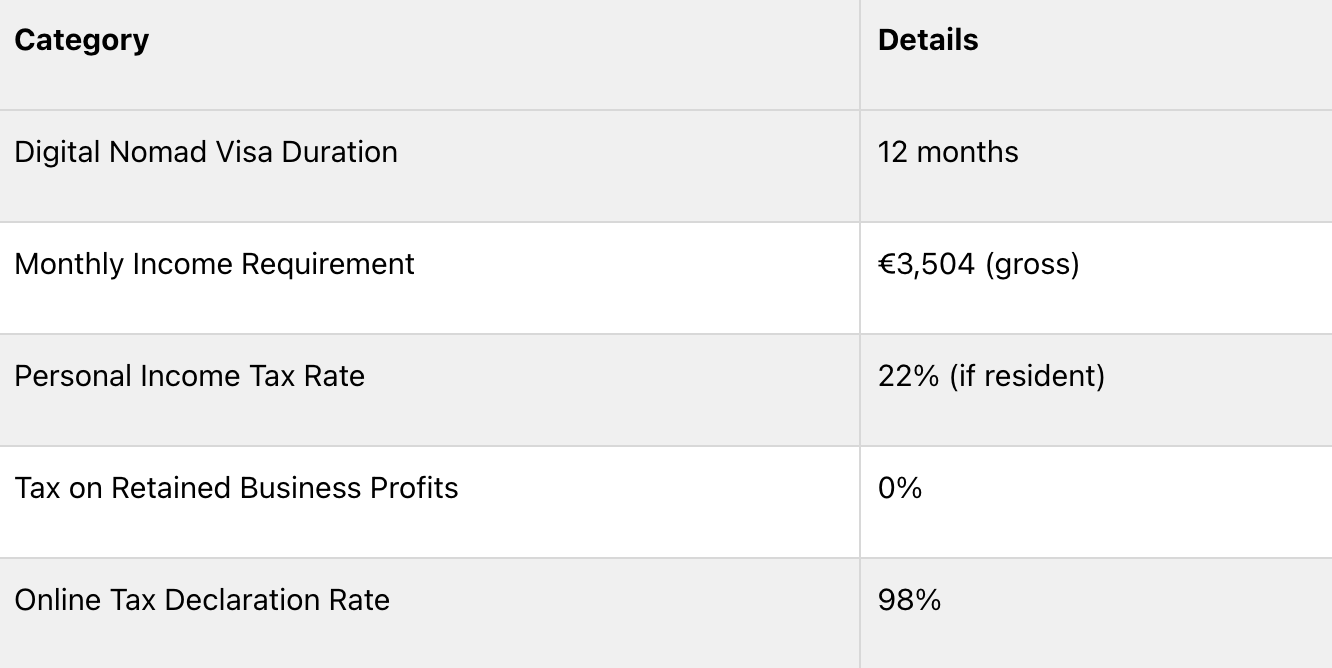
Estonia’s tax system is particularly appealing for professionals and entrepreneurs. There’s no corporate income tax on retained or reinvested profits. Additionally, the country’s highly efficient e-Tax system allows 98% of tax declarations to be filed online.
Remote workers benefit from several advantages in Estonia, including:
- Schengen Area access: The visa allows travel across many European countries.
- Cutting-edge digital infrastructure: Estonia’s e-services are among the best in the world.
- Clear tax policies: Non-residents are taxed only on income earned within Estonia.
Another bonus? International income dividends are untaxed if the underlying profits have already been taxed. With its streamlined digital systems and tax-friendly environment, Estonia is an excellent base for remote professionals looking to work and explore Europe.
5. Malta
Malta provides appealing tax schemes and EU perks for remote workers. The Global Residence Programme (GRP) and Highly Qualified Persons Rules offer attractive tax breaks.
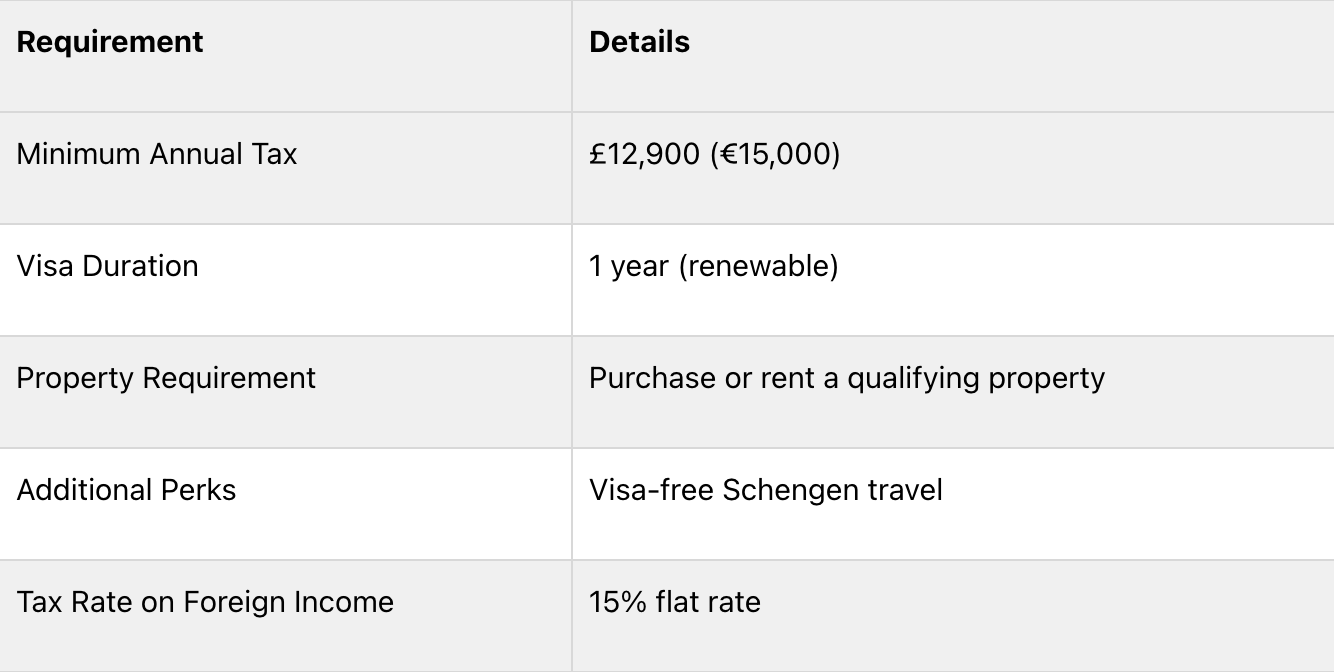
Residents in Malta are taxed only on local income and foreign income brought into the country. Capital gains remain untaxed.
To establish tax residency, you’ll need to spend at least 183 days in Malta within a calendar year. The tax system is progressive:
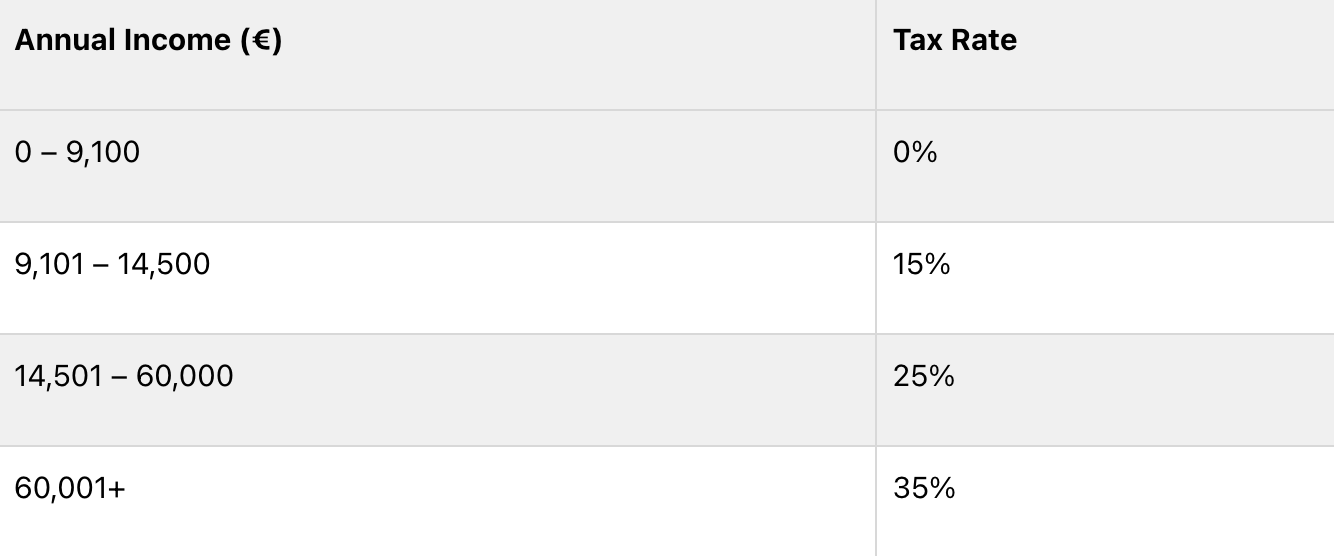
The Highly Qualified Persons Rules apply a 15% flat tax rate to professionals in sectors like financial services, gaming, and technology.
To retain these benefits, you must have valid health insurance, pass a fit and proper test, meet the minimum tax requirement, and own or rent a qualifying property.
Malta’s robust financial systems and EU membership make it an efficient tax base. Additional deductions and credits are available for education, childcare, sports, and cultural activities. Up next, learn how Croatia offers its own unique tax advantages for digital nomads.
6. Croatia
Croatia offers a Digital Nomad Visa that exempts foreign-sourced income from local taxes [10]. This visa is available for up to 12 months, with an option to apply for a shorter 6-month period. To qualify, applicants need to meet the following criteria:
- Minimum Monthly Income: £2,190 (€2,539.21)
- Health Insurance: Private coverage is mandatory
- Tax on Foreign Income: None
Eligibility Requirements
To apply, you must:
- Be a non-EU/EEA citizen aged 18 or older
- Work remotely for a foreign employer or run a business registered outside Croatia
- Have valid private health insurance
- Provide an apostilled criminal background check
- Prove the required monthly income, with an additional 10% for each family member
Application Fees
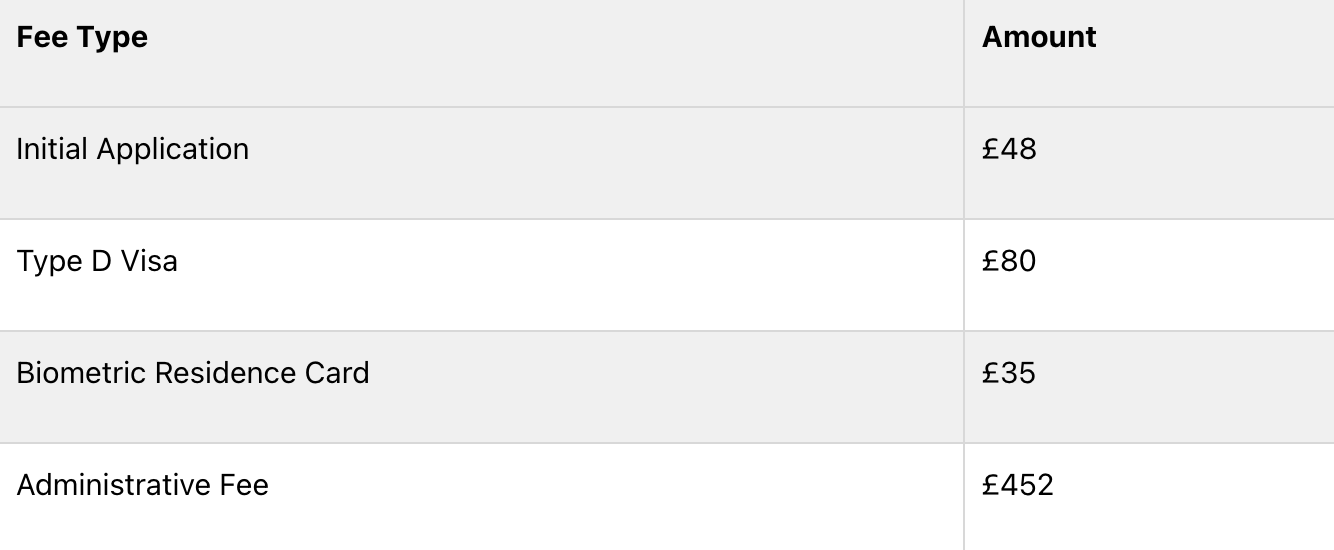
Required Documents
To complete your application, you'll need:
- A valid passport
- Proof of employment or business ownership
- Income statements
- Health insurance policy
- Apostilled and translated criminal background check (if applicable)
- A completed A1 application form
Processing Time
Applications are typically processed within 8 to 30 days, with most being finalised in under a month. Croatia’s tax-free policy on foreign income makes it an appealing option for remote workers aiming to maximise their earnings. This straightforward visa process further enhances its attractiveness for professionals seeking a tax-efficient base.
7. Portugal
In 2025, Portugal introduced the Tax Incentive for Scientific Research and Innovation (IFICI) programme, replacing the previous NHR scheme.
New Tax Benefits
The IFICI programme offers several perks:
- Special Tax Rate: A flat 20% on income earned from scientific research and innovation work
- Foreign Income Exemption: No tax on foreign-sourced income from approved countries
- Duration: Benefits apply to those who meet the criteria
Eligibility Requirements
To qualify for the programme, you need to:
- Be a new tax resident in Portugal
- Have not lived in Portugal for the past five years
- Work in an approved industry
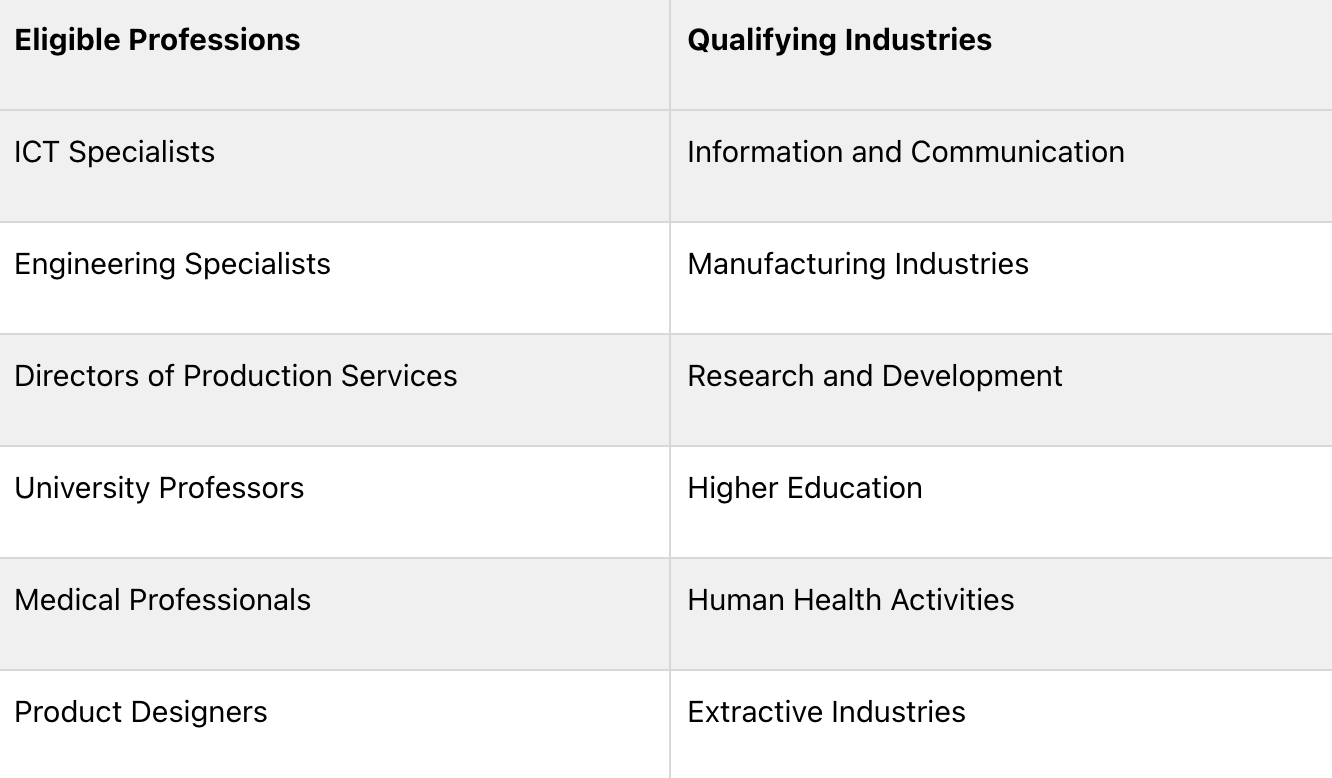
Residency Requirements
You can establish Portuguese residency by spending over 183 days in the country within a 12-month period or by maintaining a habitual residence there.
Application Process
Applications should be submitted to the relevant authority based on your profession:
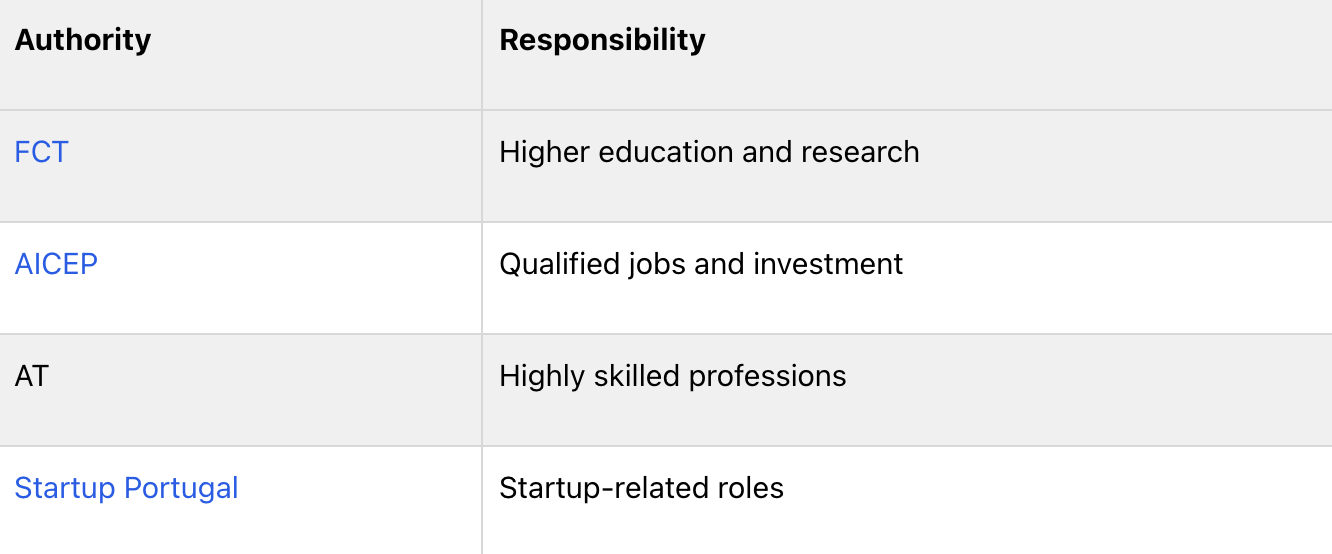
Applications must be submitted by 15 January of the year following your residency start date [11]. Ensure you include all required documents to prove your eligibility and professional credentials.
Standard Tax Rates
If you don’t qualify for IFICI, the standard tax system applies:
- Progressive rates ranging from 14.5% to 48%
- Covers both domestic and foreign-sourced income
"The Programme of the XXIV Constitutional Government has chosen as one of its main objectives to place Portugal at the forefront of innovation, digital transformation and the development of solutions that serve the country and open up new markets for our companies" [11].
This initiative strengthens Portugal's reputation as a destination for remote professionals who value innovation and tax benefits.
Tax Rates and Requirements by Country
Here’s a quick look at visa requirements and costs for different countries in 2025.
Visa Requirements and Costs
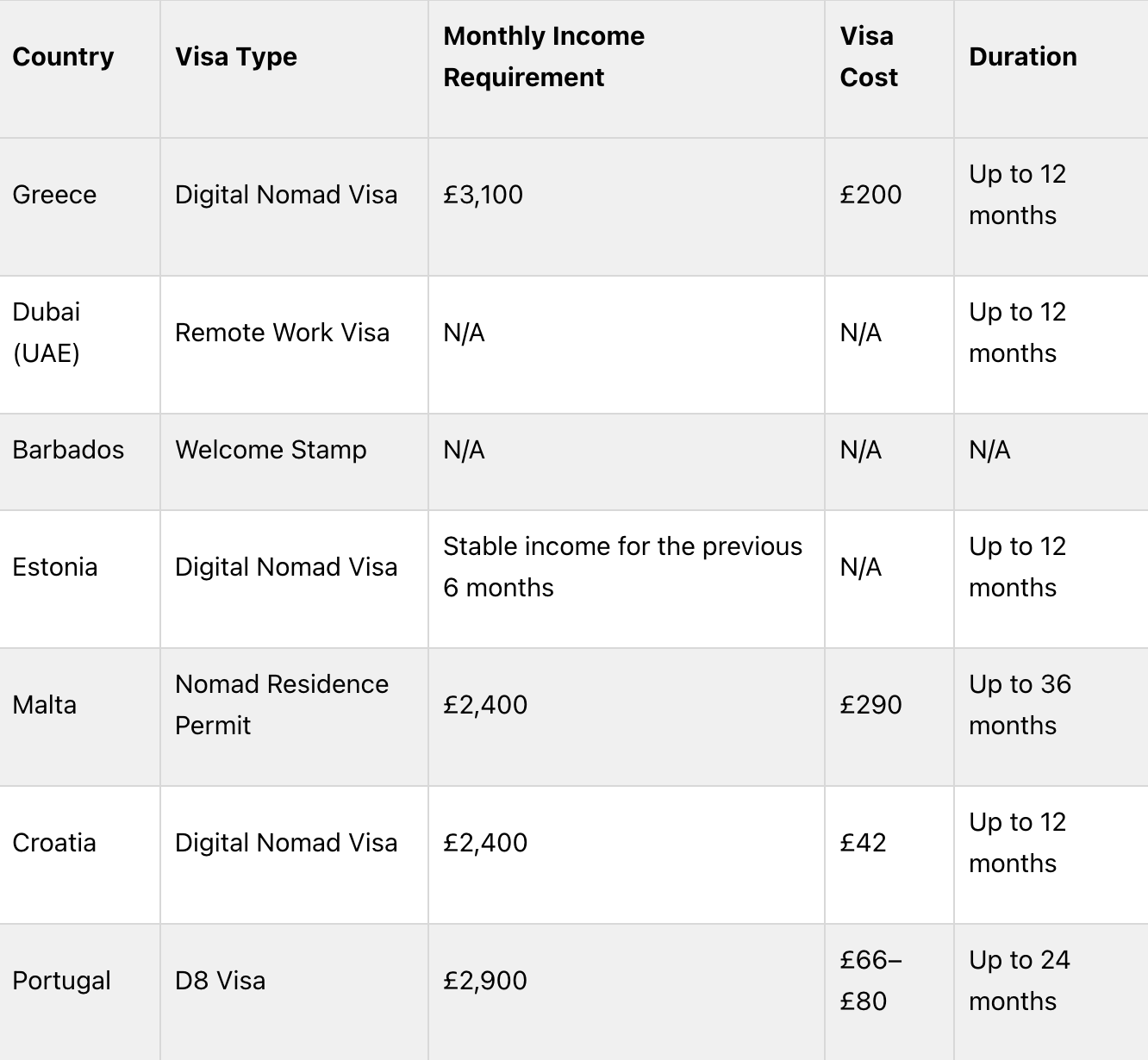
Key Documentation Requirements
Aside from income and application fees, these documents are often necessary:
- Greece: Proof of employment, valid health insurance, and a clean criminal record.
- Estonia: Evidence of remote work ability and stable income over six months.
- Malta: Health insurance, proof of accommodation, and a background check.
Additional Considerations
Be prepared to provide:
- Comprehensive health insurance
- A clean criminal record
- Recent bank statements (3–6 months)
- Evidence of remote work capability
- Proof of secured accommodation, if required
Steps to Move and Work Abroad
Get ready for your move by understanding the legal and tax requirements.
Understanding Tax Rules
Check the tax regulations in both your home country and your destination. Staying in a country for more than 183 days often establishes tax residency Familiarise yourself with Double Tax Agreements to avoid paying taxes in both countries.
Key Documents You’ll Need
Before applying for residency, make sure you have these documents ready:
- Proof of Finances
Show evidence of financial stability, such as bank statements. Some countries may require a minimum deposit in a local bank account. - Accommodation Details
Provide a rental agreement or proof of property ownership. Check if there are specific lease duration requirements. - Health Insurance
Obtain insurance that covers emergency care, including evacuation and COVID-19 treatment.
Application Timeline
Start your application process 3–4 months ahead of your planned move. Check if submissions need to be made in person or online, as this varies by country. While your application is being processed, focus on organising your finances.
Managing Your Finances
Set up your finances for a smooth transition:
- Open an international bank account
- Consult a tax advisor for guidance
- Build an emergency fund covering at least six months of expenses
- Arrange a reliable method for currency exchange
Registering Locally
Once you’ve arrived, complete the necessary local registrations to settle in fully. This may include signing up with:
- Tax authorities
- Healthcare systems
- Local banks
Keep your paperwork organised and follow all local regulations to avoid issues with your residency status.
Next Steps
Now that you know the tax perks, here’s how to take action.
Thinking about relocating to a destination with lower taxes? Start by researching the visa and tax requirements for your chosen country. For example, Malta and Greece charge modest permit fees of around £290 and £200 respectively.
Here’s how to prepare for the move:
- Plan Your Budget
Estimate your monthly costs. These typically range from £800 to £1,500 and should cover essentials like housing, utilities, transport, and savings. - Get Tax Advice
Speak with a tax professional to understand local rules, avoid double taxation, and structure your income effectively. - Check Local Essentials
Ensure the area has reliable internet, banking services, healthcare, and public transport.
Joining digital nomad communities in your new location can be incredibly helpful. These groups often share tips on settling in, navigating local systems, and finding coworking spaces. Plus, they host regular meetups, making it easier to connect with others.
Once your finances, paperwork, and infrastructure are sorted, finalise your plans. Aim to schedule a tax consultation about three months before your move. This will help you organise your finances, complete any required documents, and stay compliant with local and international laws.

